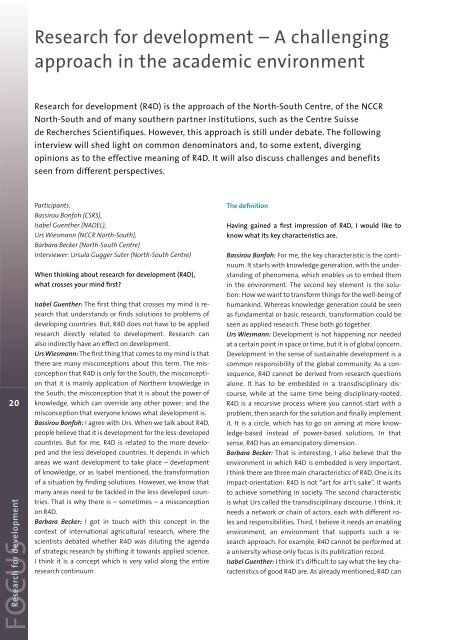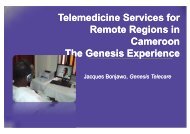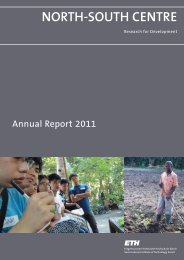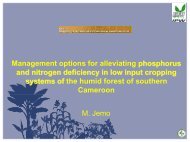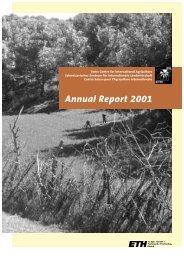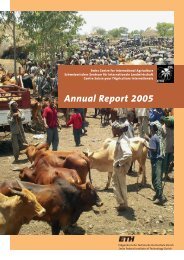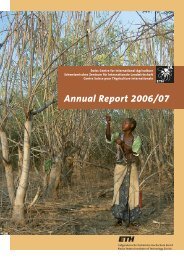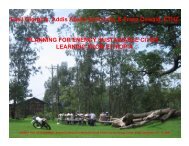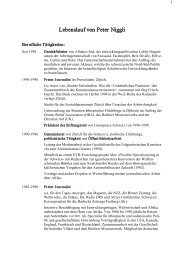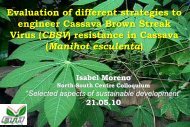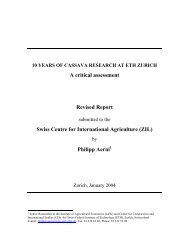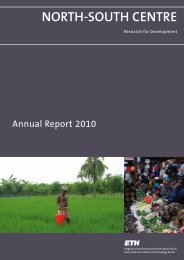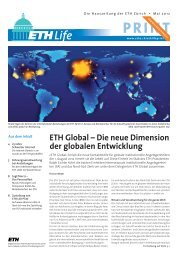NORTH-SOUTH CENTRE - ETH - North-South Centre North-South ...
NORTH-SOUTH CENTRE - ETH - North-South Centre North-South ...
NORTH-SOUTH CENTRE - ETH - North-South Centre North-South ...
Create successful ePaper yourself
Turn your PDF publications into a flip-book with our unique Google optimized e-Paper software.
Research for development – A challenging<br />
approach in the academic environment<br />
Research for development (R4D) is the approach of the <strong>North</strong>-<strong>South</strong> <strong>Centre</strong>, of the NCCR<br />
<strong>North</strong>-<strong>South</strong> and of many southern partner institutions, such as the <strong>Centre</strong> Suisse<br />
de Recherches Scientifiques. However, this approach is still under debate. The following<br />
interview will shed light on common denominators and, to some extent, diverging<br />
opinions as to the effective meaning of R4D. It will also discuss challenges and benefits<br />
seen from different perspectives.<br />
20<br />
FOCUS<br />
Research for development<br />
Participants:<br />
Bassirou Bonfoh (CSRS),<br />
Isabel Guenther (NADEL),<br />
Urs Wiesmann (NCCR <strong>North</strong>-<strong>South</strong>),<br />
Barbara Becker (<strong>North</strong>-<strong>South</strong> <strong>Centre</strong>)<br />
Interviewer: Ursula Gugger Suter (<strong>North</strong>-<strong>South</strong> <strong>Centre</strong>)<br />
When thinking about research for development (R4D),<br />
what crosses your mind first?<br />
Isabel Guenther: The first thing that crosses my mind is research<br />
that understands or finds solutions to problems of<br />
developing countries. But, R4D does not have to be applied<br />
research directly related to development. Research can<br />
also indirectly have an effect on development.<br />
Urs Wiesmann: The first thing that comes to my mind is that<br />
there are many misconceptions about this term. The misconception<br />
that R4D is only for the <strong>South</strong>; the misconception<br />
that it is mainly application of <strong>North</strong>ern knowledge in<br />
the <strong>South</strong>; the misconception that it is about the power of<br />
knowledge, which can override any other power; and the<br />
misconception that everyone knows what development is.<br />
Bassirou Bonfoh: I agree with Urs. When we talk about R4D,<br />
people believe that it is development for the less-developed<br />
countries. But for me, R4D is related to the more developed<br />
and the less developed countries. It depends in which<br />
areas we want development to take place – development<br />
of knowledge, or as Isabel mentioned, the transformation<br />
of a situation by finding solutions. However, we know that<br />
many areas need to be tackled in the less developed countries.<br />
That is why there is – sometimes – a misconception<br />
on R4D.<br />
Barbara Becker: I got in touch with this concept in the<br />
context of international agricultural research, where the<br />
scientists debated whether R4D was diluting the agenda<br />
of strategic research by shifting it towards applied science.<br />
I think it is a concept which is very valid along the entire<br />
research continuum.<br />
The definition<br />
Having gained a first impression of R4D, I would like to<br />
know what its key characteristics are.<br />
Bassirou Bonfoh: For me, the key characteristic is the continuum.<br />
It starts with knowledge generation, with the understanding<br />
of phenomena, which enables us to embed them<br />
in the environment. The second key element is the solution:<br />
How we want to transform things for the well-being of<br />
humankind. Whereas knowledge generation could be seen<br />
as fundamental or basic research, transformation could be<br />
seen as applied research. These both go together.<br />
Urs Wiesmann: Development is not happening nor needed<br />
at a certain point in space or time, but it is of global concern.<br />
Development in the sense of sustainable development is a<br />
common responsibility of the global community. As a consequence,<br />
R4D cannot be derived from research questions<br />
alone. It has to be embedded in a transdisciplinary discourse,<br />
while at the same time being disciplinary-rooted.<br />
R4D is a recursive process where you cannot start with a<br />
problem, then search for the solution and finally implement<br />
it. It is a circle, which has to go on aiming at more knowledge-based<br />
instead of power-based solutions. In that<br />
sense, R4D has an emancipatory dimension.<br />
Barbara Becker: That is interesting. I also believe that the<br />
environment in which R4D is embedded is very important.<br />
I think there are three main characteristics of R4D. One is its<br />
impact-orientation: R4D is not “art for art’s sake”, it wants<br />
to achieve something in society. The second characteristic<br />
is what Urs called the transdisciplinary discourse. I think, it<br />
needs a network or chain of actors, each with different roles<br />
and responsibilities. Third, I believe it needs an enabling<br />
environment, an environment that supports such a research<br />
approach. For example, R4D cannot be performed at<br />
a university whose only focus is its publication record.<br />
Isabel Guenther: I think it’s difficult to say what the key characteristics<br />
of good R4D are. As already mentioned, R4D can


